I was fourteen years old the summer I had my first drink. It was after the cast party of a play in which I had a bit part as a suffragette in the trial of Susan B. Anthony. No one paid attention when I scooped the red liquid from the cut glass punchbowl into my plastic cup. Cherry juice and bourbon. Orange slices frozen within a bobbing circle of ice. I still remember that first sip—the burn that quickly softened into a warm, flannelly feeling coating the back of my throat, quelling all the insecurities I ever felt inside. For the first time, I could breathe.
I spent thirty more years chasing that feeling, swimming in dark waters—my ruby-red ocean of intoxication, subsumed and submerged in the depths of drinking, using alcohol to take care of me until it took me down.
It was only years later when doing twelve-step service work, that I found myself again, in the same building, in the same room where I had had that first drink, picking up chips for my home group.
Sometimes, there are no coincidences.
Fourteen years ago today, I began the first of a series of surrenders; I became willing to look at my drinking–to recognize that although I drank socially, I was never a social drinker. I drank to get drunk; I drank for the effect; I drank as hard and as fast as I could to change how I was feeling or sometimes to feel nothing at all.
I have spoken publicly about my drinking and recovery, so I won't go into my drunkalogue here. Besides, the details of my story matter less than knowing I was a lost little girl in search of solace. A little girl born with blackened blood blisters at the base of each thumb from sucking—marks of her own making. Symptoms of both the want and lack she felt and the belief she needed and deserved something, anything, from the outside to soothe.
In retrospect, it’s ironic the lengths one will go to not look at what we know to be true, to avoid looking into the mirror and see ourselves for what we are, but that’s the insanity of alcohol—cunning, baffling, powerful—we are willing to scrutinize everyone and everything as the root cause of our drinking, anything other than the drinking itself.
Until we’re not.
A few months ago, I read an article in the NYT about the perils of something called high-intensity drinking, claiming it to be worse than binge drinking because:
Consuming eight or 10 drinks in a short period of time can produce a blood alcohol concentration, or B.A.C., of over 0.2 percent, which significantly increases the risk of injuries, overdose and deaths. When people drink that much, the risk of harm goes up pretty dramatically. For comparison, a regular binge (four or five drinks) typically results in a B.A.C. of around 0.08 percent.
Okay, I’m going to be brutally honest—as a person in recovery, four or five drinks sounds pretty ho-hum, whereas eight to ten feels more like bordering on a binge, but I digress. What fascinated me most about the article was the fact that the word alcoholism was never even mentioned.
There was a time I would have bought into this definition of being a high-intensity drinker, a time when I would have looked at the above list of consequences and only seen the way it was not me—a time when I still clung to the belief I could be anything but an alcoholic.
If I could only learn to drink differently, everything would be fine.
I once went so far as to ask my husband for help, confessing in the early hours one morning that I was worried about how much I was drinking and thought maybe I should go to rehab. I remember where he stood when we had this conversation, getting dressed for work, knotting his silk tie, looking me up and down, assessing the situation before pausing and announcing he didn’t think I was really an alcoholic; he thought I was a binge drinker.
At that moment, I’m not sure who was more relieved. Because I had asked for help, and instead of addressing the severity of the situation, I got a get-out-of-jail-free card. Binge drinking was a disorder we could both live with, at least for a while longer.
When I turned forty, I knew my dependence was getting worse, so I made myself a bargain that while I wouldn’t stop drinking entirely, I would never get drunk again. I think you can imagine how that turned out.
When you’re drinking, you think you’re so smart, you think you’re fooling everyone, you think you got it all figured out, and then on your path of recovery, you discover that everyone was switching liquor stores and their hiding bottles. Everyone was taking online quizzes about whether or not they were an alcoholic over and over, each time rationalizing their answers, expecting different results, all the while drowning inside.
Being an alcoholic is exhausting.
In the end, it was just me. Drinking. Alone. At my kitchen table. Hiding my drinking in plain sight and dying a little more each day. The alcohol that had first been my savior and mother’s helper had turned against me before I even opened the bottle. Still, I didn’t know how to live without it until the night my husband told me if I didn’t stop drinking, he was going to leave me and take the kids, and with that threat came the strength to surrender.
If anyone tells you getting sober is easy, they are lying, but it does get less hard, and I’ve come to know that even my worst day sober is far better than my best day drunk.
Living a sober life is so much more than not slurring your words; it’s about turning your stumbling blocks into stepping stones and telling yourself new stories. Living sober is about finding and then trusting your voice as all you were meant to be.
Ultimately, getting sober didn’t save my marriage. I’ve come to believe that was never its intention, but it was the ultimatum I needed to save myself, and it offered me the strength and the clarity with which to leave.
Six years later, there was a second surrender when, on my sobriety date, my husband and I were summoned to sign our divorce papers. After it was over, I drove to a meeting and picked up my chip.
Sometimes, there are no coincidences.
Over the past fourteen years, I’ve learned alcoholism and drinking can look like many things. It doesn’t have to be the cliche of a withered, old man living under the bridge clutching a bottle in a brown paper sack. An alcoholic can be a doctor’s wife with an Oak Hill Country Club membership and a Volvo station wagon. She can be someone’s mother or daughter or your yoga instructor. Anyone can be an alcoholic. There should be no shame. Because on the other side, it becomes possible that alcoholism doesn’t even have to look like drinking. It can look like living a full, meaningful life.
Alcoholism can look like recovery.
A few years ago, my son commented confidently in passing that he knew I would never drink again, and while I’m grateful he sees that strength within me, it’s also terrifying, for that’s how my mind could become complacent and entice me to slip into dark waters again. Every day sober is just a reprieve because I will always be an alcoholic, but I can choose to be an alcoholic who doesn’t drink.
It’s been fourteen years since I had my last drink, the same number of years marking that fateful first drink, the same age my firstborn was when I stopped. At twenty-eight, Evan has now known me in life to be half-drunk, half-sober, and as much as I may wish those first fourteen were different, I know you need half of anything to become whole.
In the past, the days walking up to my anniversary haven’t been easy, for they are a reckoning and a remembering of everything that brought me to my knees. But this year, I’ve barely given it a second thought because the world feels so hard. If anything, I’m noticing how I need to do a better job putting boundaries around myself because I cannot allow breaking news to break me or affect how I show up in the world.
If sobriety has taught me anything, it has taught me that the only thing I have control over is my actions. I can choose how I move through life and whether I experience it to be half empty or half full. I have to remember that sometimes darkness is the foundation of astonishment, and all that I believe to be true must sometimes break to be reborn.
My mind can still mix cocktails—shaking and stirring fears into stories all their own; in short, I will never be cured. I will always be an alcoholic, but I don’t have to drink over it either. So just for today, may I resign from my position of general contractor of the universe1 to try to carry and manage everything and instead extend my hand to others in a way that is meaningful rather than manipulative. To keep things in the present to remind myself that right now it’s a gift to be alive even in this severely broken world.
thanks for being here,
xosew
PS
If, in these troubled times, you, too, are craving community, keep reading because I’m offering a new workshop TODAY and reviving my weekly online writing circle, gathering (in grace) notes.
UPCOMING EVENTS AND (THREE) WAYS TO BE TOGETHER
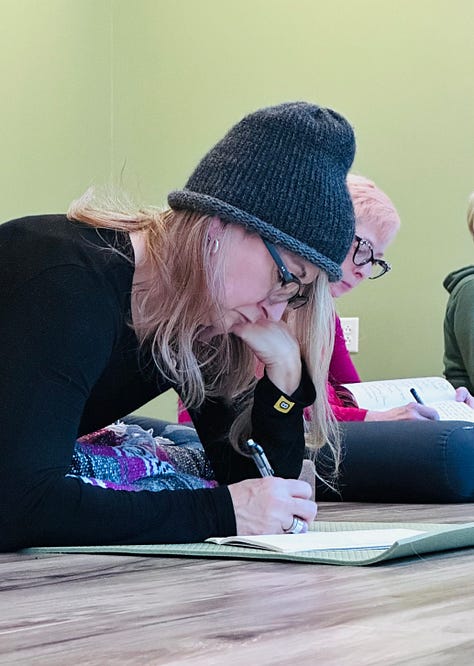
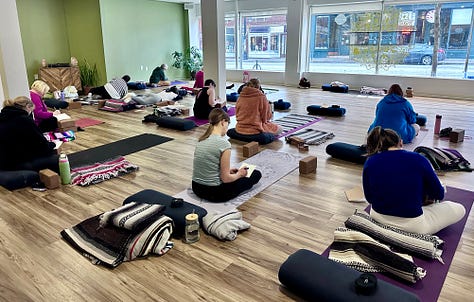
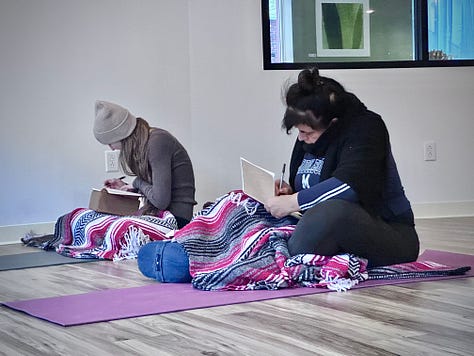
TODAY!!!
Set Your Intention: from breath to pen | January 26, 1-2 pm ET
At the beginning of January, I facilitated a writing workshop at Tru Yoga in which we gathered in community to reflect on and close out one year and then set heartfelt intentions, welcoming all that is to come.
During the workshop, I mentioned how January could be a long, cold, dark month to begin anything, so rather than commit to anything, I allow myself to pause and fully sit with the intentions I set for 31 days more.
little did I know how long and cold and dark and generally shitty the month would actually be… . ..
If this resonates with you, if you’re rethinking how you wish to move forward (again) into the new year, or if you simply want to gather with one another, let’s light a candle, pour a cup of tea, bring your favorite pen, something to write in, and a loose sheet of paper, and let’s write together!
January 26, 1-2 pm ET
there is a $5 suggested donation • if you are a paid newsletter subscriber or attended in-person at TRU, I invite you to be my guest.
gathering (in grace) notes returns!
Looking for some butt-in-chair writing accountability? Lord knows I do 🤦♀️
Beginning Monday, January 27, 7:30 - 8:30am ET, I’ll be hosting an online writing circle to encourage a creative start to the week. Honestly, I’m doing this more for me than anyone else, but I’d love to have you join me because I know the power of coming together and writing in community.
Each week, you are invited to come as you are. We will greet one another; I will offer a prompt in the chat if you are looking for a way to begin, and then we will write for 60 minutes with our screens on or off—that’s it!
This is a free offering for all. If you find you are attending regularly and ever wish to make a donation in support of maintaining the space, you can always buy me a book.
Register once, and the link is yours forever—I hope to see you there!!
and … . .. . . …. .
EARLY BIRD REGISTRATION OPENS FEBRUARY 10
Braiding Sweetgrass: Breathing Stories • September 17-21, 2025 • Monhegan, ME
For the fifth year, I invite you to join me for an intimate retreat on island. Our program is an embodied book group, journeying and journaling through the wisdom and words of Robin Wall Kimmerer’s memoir Braiding Sweetgrass with the magic of Monhegan. full details LIVE on my website February 1!
Thanks for being here. I’m grateful for your readership. Before you go, would you click the ♥️ or share this post with a friend? You may also restack, leave a comment, or reply via email because it helps others find this newsletter. If you want to see a little more of my island time you can follow me on Instagram, too.
I can take credit for the sentiment; however, it was Judith Lasater, in all her eloquence, who reminded me that not one of us need be the “general contractor of the universe.”



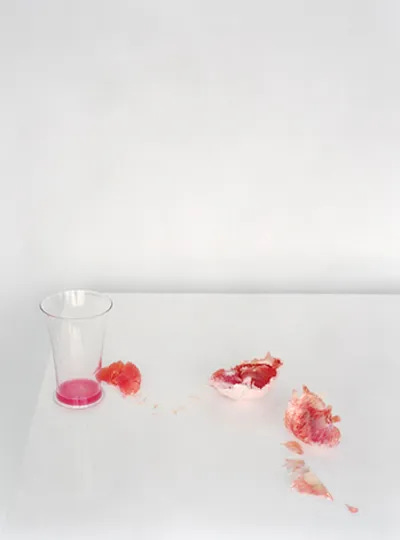



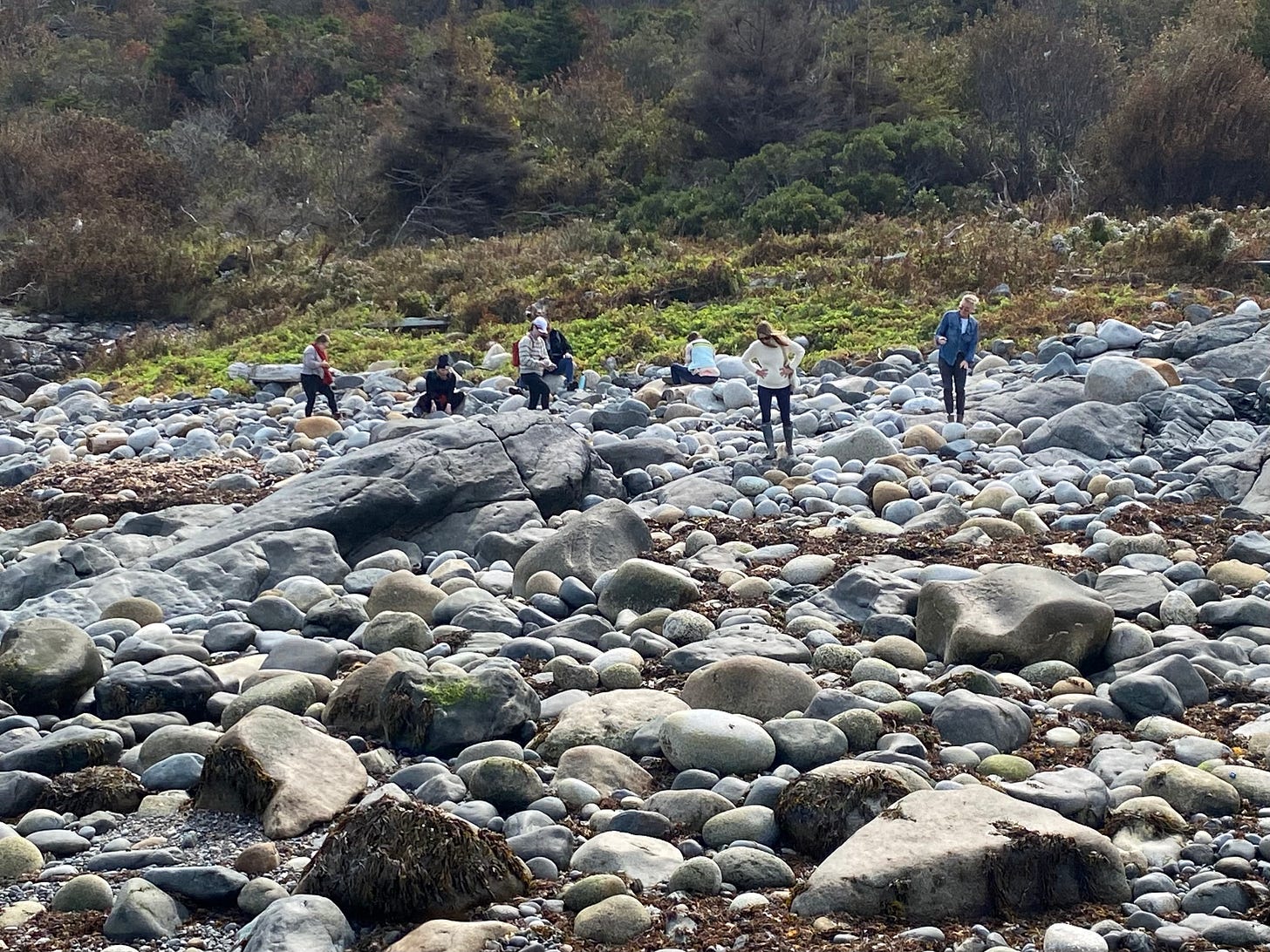

bravo sarah, open arms for deeper breath and beating heart !
Congratulations on fourteen years. What a gift.